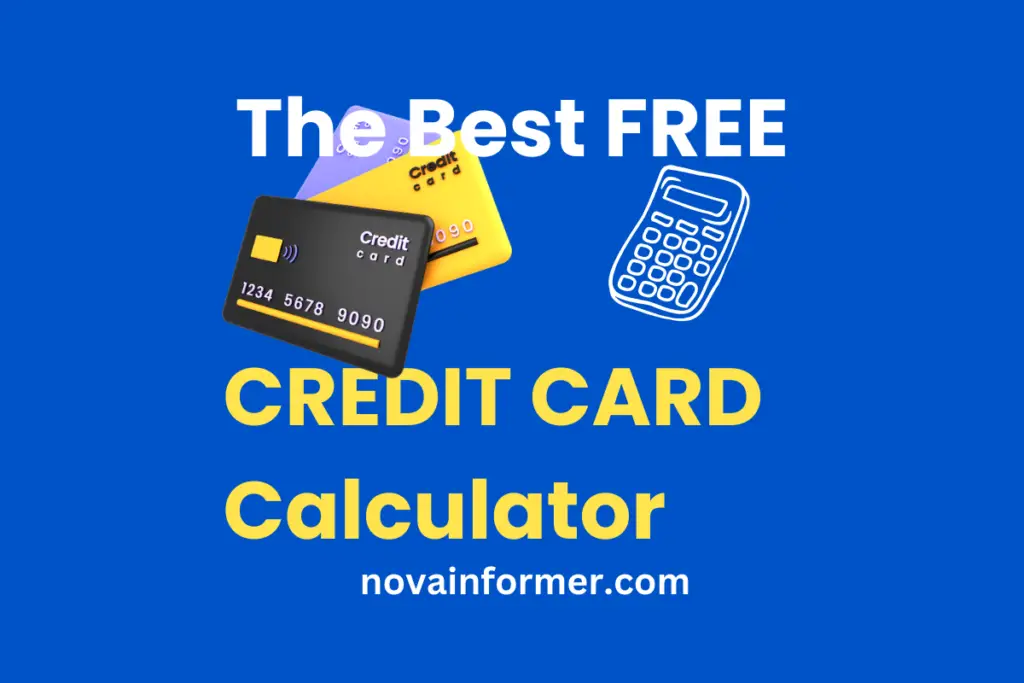Explore debt freedom with our intuitive Credit Card Calculator, simplifying payoff projections and repayment strategies.
This calculator will show how long it will take you to pay off your balance at your currently monthly payment.
Your monthly payment is less than your monthly interest fee
See how much you would need to pay a month to clear your debt more quickly.
Key Takeaways
- Credit Cards Defined: Credit cards are financial tools allowing users to make purchases on credit, offering convenience and flexibility.
- Historical Evolution: From charge plates to modern plastic, credit cards have a rich history reflecting economic changes.
- Modern Significance: Credit cards play a vital role in today’s financial landscape, facilitating transactions and building credit.
- Article Overview: The article covers credit card types, usage, management, advanced topics, FAQs, and future trends.
Introduction
Definition and Importance of Credit Cards
Credit cards, those magical pieces of plastic that grant purchasing power with a mere swipe or tap. But what are they exactly? In the financial realm, credit cards are like a short-term loan
They allow you to borrow money to make purchases, and you’re expected to pay it back by the due date to avoid hefty charges.
The importance of credit cards extends beyond just being a convenient payment method. They’re gateways to building credit, providing financial flexibility, and unlocking various perks. As we embark on this credit card journey, let’s uncover their significance.
Historical Evolution of Credit Cards
To appreciate the modern marvel of credit cards, a quick dip into history is in order. The roots trace back to the 1920s, where charge plates were used by individual stores for customer identification.
Fast forward through the years, and we witness the introduction of the first bank-issued credit card in the 1950s by Diners Club. The evolution continued with the magnetic stripe in the ’70s, and today, we’re amidst contactless and chip-based cards.
This journey mirrors societal shifts, economic expansions, and technological advancements.
Significance in Modern Financial Transactions
In the contemporary financial landscape, credit cards are more than just a means of payment. They are financial multitools. They offer a secure way to transact, build credit history, and provide a safety net in emergencies.
With the advent of online shopping, contactless payments, and global transactions, credit cards have become indispensable. Our wallets are no longer just leather pouches but portals to a world of financial possibilities.
Get ready for an insightful exploration into the world of credit cards.
How to Use this Credit Card Calculator
If you’re eager to understand how long it will take to clear your credit card balance or determine how much you need to pay monthly to expedite debt repayment, this calculator is your financial ally. Here’s a quick guide on how to make the most of this tool:
Term Calculator (Time until Payoff)
- Balance: Enter your current credit card balance in the “Balance” field.
- APR (Annual Percentage Rate): Input your credit card’s APR.
- Monthly Payment: Specify your current monthly payment toward your credit card debt.
- Note: Ensure your monthly payment is greater than the monthly interest fee to avoid errors.
- Calculate: Click the “Calculate” button to unveil the estimated time it will take to pay off your credit card balance.
- Result: The calculator will display the time until you pay off your credit card balance.
Payment Calculator (Monthly Payments)
- Balance: Enter your credit card balance in the “Balance” field.
- APR (Annual Percentage Rate): Input your credit card’s APR.
- Repayment Term: Choose how quickly you’d like to clear your balance by entering the desired number of years and/or months.
- Example: If you want to pay off the balance in 2 years, enter “2” in the “Years” field.
- Calculate: Click the “Calculate” button to discover the monthly payments required to achieve your desired payoff time.
- Result: The calculator will display your monthly payments.
Tips for Effective Use
- Formatting Inputs: Ensure to format your inputs properly. The calculator accepts currency values and percentages.
- Review Results: Examine the results carefully. The tool provides insights into your credit card debt repayment plan.
- Explore Both Calculators: Depending on your financial goals, use either the Term Calculator for estimating payoff time or the Payment Calculator to determine monthly payments.
Empower yourself with these financial insights, and take control of your credit card debt with informed decision-making.
Types of Credit Cards
Rewards Credit Cards
Rewards credit cards are the rock stars of the credit card world, offering perks like cash back, travel miles, or points for every purchase. Choosing the right rewards card depends on your spending habits and lifestyle. Let’s break down the rewards landscape:
| Card Type | Perks | Best For |
|---|---|---|
| Cashback | Direct cash rewards | Everyday spending |
| Travel Miles | Airline miles, hotel discounts | Frequent travelers |
| Points | Redeemable for various rewards | Versatile spenders |
Cashback Credit Cards
Cashback credit cards put money back into your pocket with every swipe. Imagine getting a percentage of your spending returned – it’s like a discount on everything you buy. Here’s a glimpse:
| Card | Cashback Rate | Special Categories |
|---|---|---|
| Cashback Champ | 1.5% – 2.5% | Groceries, gas, dining |
| Online Shopping Pro | 2% – 3% | E-commerce purchases |
| Travel Enthusiast | 1% – 2% | Discounts on travel expenses |
Travel Credit Cards
For the jet-setters and adventure seekers, travel credit cards are the key to unlocking a world of benefits. Earn points for flights, hotel stays, and more. Let’s explore the perks:
| Card Features | Travel Benefits | Additional Perks |
|---|---|---|
| Flight Warrior | Airline miles, lounge access | Global entry fee reimbursement |
| Hotel Explorer | Free hotel nights, room upgrades | Travel insurance coverage |
| Adventure Plus | Adventure-related discounts | Concierge service for bookings |
Secured vs. Unsecured Credit Cards
Credit cards can be categorized into secured and unsecured types. The key difference lies in collateral – secured cards require a deposit, acting as a safety net for the issuer. Here’s a quick comparison:
| Type | Collateral | Best For |
|---|---|---|
| Secured | Deposit required | Building or rebuilding credit |
| Unsecured | No collateral needed | Established credit history |
How Credit Cards Work
Understanding the mechanics of credit cards is crucial to wield them wisely. Let’s unravel the mysteries of credit limits, interest rates, grace periods, and minimum payments.
Credit Limits
Your credit limit is like a financial leash – it sets the maximum amount you can borrow. Responsible use can lead to credit limit increases, expanding your financial playground.
Interest Rates
The infamous APR (Annual Percentage Rate) is the cost of borrowing. A lower APR is your financial ally, reducing the interest burden on balances carried over.
Grace Periods
Credit cards often offer a grace period, a window where you can pay off your balance without incurring interest. Know your statement cycle to make the most of this grace.
Minimum Payments
While paying the full balance is ideal, minimum payments keep you in good standing. However, they come with a catch – interest accrues on the remaining balance.
Stay tuned as we navigate through the labyrinth of credit card intricacies in the upcoming sections, from applying for a credit card to managing it responsibly. It’s a financial adventure worth embarking on.
Responsible Credit Card Use
Budgeting and Planning
Let’s face it – budgeting isn’t the most exciting activity, but it’s a superhero move for responsible credit card ownership. Create a monthly budget, track your spending, and allocate a specific amount for credit card payments.
This not only prevents overspending but also ensures you can pay your balance in full each month.
Avoiding Impulse Purchases
Credit cards and impulse buying often go hand in hand. That shiny gadget or that tempting sale – it’s hard to resist. Combat impulse purchases by creating a wishlist and giving yourself a cooling-off period before hitting the checkout button.
Monitoring Statements
Statements are like report cards for your financial behavior. Regularly review them to spot any unauthorized charges, track your spending patterns, and ensure your budget is on track.
It’s your ticket to catching potential issues early.
Understanding Credit Scores
Factors Affecting Credit Scores
Your credit score is a numerical reflection of your creditworthiness. Understand the factors influencing it:
- Payment History: Timely payments are your credit score’s best friend.
- Credit Utilization: Keep your credit card balances below 30% of your limit.
- Length of Credit History: A longer credit history is a positive factor.
- New Credit: Opening several new accounts quickly can be a red flag.
- Types of Credit: A mix of credit types can be beneficial.
How Credit Card Usage Impacts Credit Score
Your credit card behavior plays a significant role in shaping your credit score. On-time payments and responsible credit utilization can boost your score, while late payments and maxed-out cards can have the opposite effect.
More related Financial Calculators
Dealing with Credit Card Debt
Strategies for Debt Repayment
If you find yourself in the clutches of credit card debt, fear not. Strategies abound:
- Snowball Method: Pay off smaller debts first, gaining momentum.
- Avalanche Method: Tackle high-interest debts first to minimize overall interest paid.
- Debt Consolidation: Combine multiple debts into one, potentially lowering interest rates.
Seeking Professional Advice
When the debt mountain seems insurmountable, consider seeking advice from financial professionals. Credit counseling agencies and debt consolidation services can provide tailored strategies to ease your financial burden.
In the upcoming advanced credit card topics, we’ll explore security measures, benefits, fees, and charges. Stay tuned for insights that will enhance your credit card mastery.
Credit Card Security
Tips for Secure Online Transactions
In the digital age, online transactions are the norm. Safeguard your financial fortress with these security tips:
- Use Secure Websites: Look for “https://” and a padlock icon in the address bar.
- Keep Passwords Strong: Mix letters, numbers, and symbols; update them regularly.
- Enable Two-Factor Authentication: Add an extra layer of protection.
Reporting Lost or Stolen Cards
Losing your credit card is a mini heart attack moment. Act swiftly:
- Contact Your Issuer Immediately: Report the loss or theft promptly.
- Monitor Your Statements: Check for unauthorized transactions.
- File a Police Report: Provide a written record of the incident.
Credit Card Benefits and Perks
Travel Insurance
Travel credit cards often come with built-in travel insurance. Before booking that trip, check your card’s coverage:
- Trip Cancellation Insurance: Reimburses non-refundable trip expenses.
- Rental Car Insurance: Covers damage or theft of rental vehicles.
- Lost Luggage Reimbursement: Compensation for lost or damaged baggage.
Purchase Protection
Ever bought something only to watch it break the next day? Purchase protection has your back:
- Extended Warranty: Adds extra time to the manufacturer’s warranty.
- Price Protection: Refunds the difference if an item’s price drops shortly after purchase.
- Return Protection: Reimburses you if a store won’t accept a return.
Rewards Programs
Maximize your credit card experience by tapping into rewards programs:
- Points Accumulation: Earn points for every purchase.
- Redemption Options: Cash back, travel rewards, gift cards – explore your redemption choices.
- Special Promotions: Keep an eye on limited-time offers for bonus rewards.
Credit Card Fees and Charges
Annual Fees
While many credit cards come free of annual charges, some premium cards may have fees. Consider whether the benefits outweigh the cost.
Foreign Transaction Fees
Jetting off on an international adventure? Watch out for foreign transaction fees. Some cards offer fee-free global spending – a travel enthusiast’s dream.
Late Payment Penalties
Life happens, and sometimes payments slip through the cracks. Late payments not only incur fees but can also negatively impact your credit score. Set up reminders to avoid this pitfall.
Next, we’ll dive into frequently asked questions, addressing common queries and providing clarity on credit card intricacies. Get ready for a Q&A session that demystifies the world of credit cards.
FAQs
How to Choose the Right Credit Card?
Choosing the right credit card depends on your lifestyle and spending habits. Evaluate factors such as rewards, fees, and interest rates. If you travel frequently, a travel rewards card might be ideal. For everyday spending, consider cashback cards.
What Is a Good Credit Score for Getting a Credit Card?
A credit score above 700 is generally considered good, but requirements vary. Higher scores open doors to better card options and lower interest rates.
How Can I Improve My Credit Score?
Improve your credit score by paying bills on time, reducing credit card balances, and avoiding opening multiple new accounts quickly.
What Should I Do If My Credit Card Is Stolen?
Act swiftly! Report the loss to your issuer, monitor statements for unauthorized transactions, and file a police report for an added layer of protection.
Are There No Annual Fee Credit Cards?
Yes, many credit cards come without annual fees. Explore options to find a card that aligns with your financial goals without adding extra costs.
How Can I Dispute a Credit Card Charge?
If you spot an error or unauthorized charge, contact your credit card issuer immediately. They will guide you through the dispute process and investigate the issue.
What’s a Credit Utilization Ratio, and Why Does It Matter?
Your credit utilization ratio is the percentage of your credit limit you’re using. Aim to keep it below 30% to maintain a healthy credit score.
Can I Transfer Balances Between Credit Cards?
Yes, balance transfers can be a strategic move to consolidate debt and lower interest payments. Be mindful of transfer fees and introductory APR periods.
Recap of Key Points
In this credit card journey, we’ve covered the definition and historical evolution of credit cards, their significance today, types, working mechanisms, application processes, and responsible usage. We delved into advanced topics like security, benefits, fees, and charges.
Encouragement for Responsible Credit Card Usage
Credit cards, while powerful, require a delicate touch. Use them responsibly, budget wisely, and stay informed about your financial health. Your credit card is not just a transaction tool; it’s a pathway to financial well-being.
In Conclusion: Future Trends in Credit Card Technology
As we bid adieu, let’s glance into the crystal ball.
The future of credit cards might involve enhanced security measures, innovative rewards programs, and even more seamless integration with emerging technologies. Stay curious, stay informed, and keep swiping responsibly!
Congratulations on mastering the art of credit cards – may your financial journey be prosperous and debt-free!
License:
by Nick McBurney (https://codepen.io/NickMcBurney/pen/qNxKzb)



